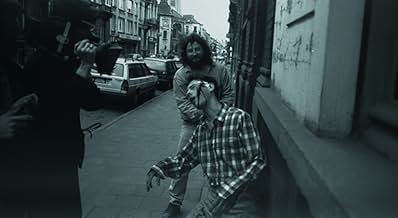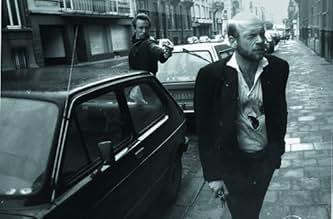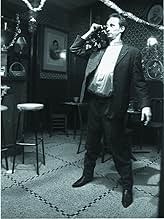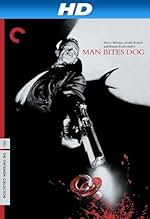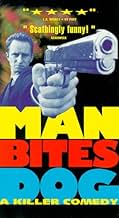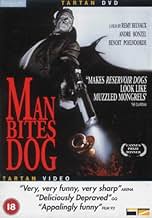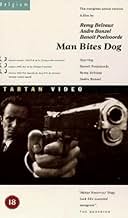AVALIAÇÃO DA IMDb
7,4/10
45 mil
SUA AVALIAÇÃO
Uma equipe de filmagem segue um ladrão implacável e assassino sem coração em sua rotina diária. Eles perdem sua objetividade e começam a ajudar.Uma equipe de filmagem segue um ladrão implacável e assassino sem coração em sua rotina diária. Eles perdem sua objetividade e começam a ajudar.Uma equipe de filmagem segue um ladrão implacável e assassino sem coração em sua rotina diária. Eles perdem sua objetividade e começam a ajudar.
- Direção
- Roteiristas
- Artistas
- Prêmios
- 7 vitórias e 5 indicações no total
Jacqueline Poelvoorde-Pappaert
- Ben's Mother
- (as Jacqueline Poelvoorde Pappaert)
Édith Le Merdy
- Nurse
- (as Edith Lemerdy)
Avaliações em destaque
I'd have to rank this with "Henry, Portrait Of A Serial Killer" as one of the sickest and disturbing films I've ever seen. But like "Henry," it's fascinating.....and certainly different.
It is a fake (thank goodness!) documentary with sleazy cameramen following around a serial killer as the latter murders a bunch of people while spouting philosophy between killings. Some of the demented killer's words are downright funny because of their absurdity. Perhaps that is why this is labeled by some as a black comedy, but this is so dark it is difficult for me to rate this as a comedy, even though it's there.
Most of the killings are not gruesome but there are a few that qualify for that status. They don't dwell on the blood but they don't spare anything in here, either. This film is so strange, so bizarre that one has to see it believe it. That is not just a cliché. You have not seen a film like this: I guarantee it.
A couple of Belgians - Benoit Poelvoorde, Remy Belvaux and Andre Bonzel - did almost all the work on this movie: writing, directing, editing and acting. They were new to the business, had little money and wanted to make a film with those limited resources....and they succeeded very well.
It is a fake (thank goodness!) documentary with sleazy cameramen following around a serial killer as the latter murders a bunch of people while spouting philosophy between killings. Some of the demented killer's words are downright funny because of their absurdity. Perhaps that is why this is labeled by some as a black comedy, but this is so dark it is difficult for me to rate this as a comedy, even though it's there.
Most of the killings are not gruesome but there are a few that qualify for that status. They don't dwell on the blood but they don't spare anything in here, either. This film is so strange, so bizarre that one has to see it believe it. That is not just a cliché. You have not seen a film like this: I guarantee it.
A couple of Belgians - Benoit Poelvoorde, Remy Belvaux and Andre Bonzel - did almost all the work on this movie: writing, directing, editing and acting. They were new to the business, had little money and wanted to make a film with those limited resources....and they succeeded very well.
That's the one I was looking for...
Beautifully shot in black and white, this piece of art about a killer followed by a film crew is technically incredible.Camera movements or sound effects are among the most innovative I have ever seen. Besides, the dialogues are so funny...
We watch a lot of people being shot and this might shock a lot of people, but if the viewers bear in mind the real purpose of this "massacre" (to denounce the violence rather than glorify it), this movie is really funny.
I surprised myself talking with a Belgium accent and learning by heart the dialogues in order to make people laugh. It lasted 3 years...
This is definitely a masterpiece that I would not recommend to everybody, especially because of its visual violence, but filmgoers who would like to see something different should definitely check this one.
Beautifully shot in black and white, this piece of art about a killer followed by a film crew is technically incredible.Camera movements or sound effects are among the most innovative I have ever seen. Besides, the dialogues are so funny...
We watch a lot of people being shot and this might shock a lot of people, but if the viewers bear in mind the real purpose of this "massacre" (to denounce the violence rather than glorify it), this movie is really funny.
I surprised myself talking with a Belgium accent and learning by heart the dialogues in order to make people laugh. It lasted 3 years...
This is definitely a masterpiece that I would not recommend to everybody, especially because of its visual violence, but filmgoers who would like to see something different should definitely check this one.
Man Bites Dog (C'est arrivé près de chez vous).
To say this movie is disturbing would be an understatement. A massive, gigantic understatement! But it is also a display of film-genius.
The movie is filmed in Black and White and is presented as a "documentary" of a serial killer. The film crew follows Benoit, the killer, around town as he recites poetry, muses on welfare and housing reform, ponders philosophy, and ... well, kills. Totally randomly.
He explains to the film crew the lessons he has learned about killing, how to stay low key, who to go after, and what potential victims are a waste of time. For Benoit, killing is an art form, but not one that should be undertaken frivolously.
There are scenes when his lunacy are briefly pierced by humanity - he counsels one of the film crew not to kill, because once you start it becomes a habit. In another scene he laments having killed a suburban family, because they had nothing good to steal, as it turned out. He proclaims that "there should be a law against" killing for no good reason.
Those who shy from blood and killing - about the most graphical violence you'll ever see "documented" in a film - should shy from this movie. But anyone with an interest in a glimpse at the darkest side of human nature will appreciate this film, not necessarily for its story or its darkness, but for its ability to make us think, and open our eyes to human behaviour we don't like to admit might exist.
During the course of the movie you become totally numb to the act of killing (or maming or torture or rape or any violent crime). It is no longer shocking when he kills yet another victim. It has become commonplace. You just sort of scratch your head and wonder - why this one? why now? why him? why her? This mental numbness is made possible by the way it is filmed - as though it were a documentary. Not long into the movie you begin to wonder if this is real, or just a movie. I wonder if this is the kind of numbness that soldiers experienced in wars like WWI, entrenched and under constant fire - to where the violence around become the norm. I read a book once called "My War Gone By, I Miss it So" (that's a whole 'nother review) in which a war-writer kept returning to the front because after experiencing violence all around him day after day after day, he could no longer live without it. In Man Bites Dog the killing is Benoit's addiction, but we, as viewers become complacent to it. We have been numbed to where it is no longer disturbing. Makes you scratch your head and wonder: is such detachment from emotion and what's right really possible???
To add to the realism, all the actors play characters with their real names. The killer's mother and grandparents in the movie - are really the actor's mother and grandparents in real life. During most of the filming they were not told it was about serial killing, just that they were in a movie with their son. So they just act normal around the son they love, only to find out in later scenes that the whole film is about killing. Imagine the look of shock on their faces to find this out - to them the story then is no longer acting but real: they've just discovered their son/grandson made a film about brutal killings and the shock shows in their faces.
Is it real? Is it a movie? What defines the difference?
When I told him about this movie, a friend mentioned that "society,as a whole, is already numb to brutal killing and violence." He's right about that. But this movie is so ridiculously brutal and violent it is more a mockery of our society's complacence to violence, not an endorsement.
To say this movie is disturbing would be an understatement. A massive, gigantic understatement! But it is also a display of film-genius.
The movie is filmed in Black and White and is presented as a "documentary" of a serial killer. The film crew follows Benoit, the killer, around town as he recites poetry, muses on welfare and housing reform, ponders philosophy, and ... well, kills. Totally randomly.
He explains to the film crew the lessons he has learned about killing, how to stay low key, who to go after, and what potential victims are a waste of time. For Benoit, killing is an art form, but not one that should be undertaken frivolously.
There are scenes when his lunacy are briefly pierced by humanity - he counsels one of the film crew not to kill, because once you start it becomes a habit. In another scene he laments having killed a suburban family, because they had nothing good to steal, as it turned out. He proclaims that "there should be a law against" killing for no good reason.
Those who shy from blood and killing - about the most graphical violence you'll ever see "documented" in a film - should shy from this movie. But anyone with an interest in a glimpse at the darkest side of human nature will appreciate this film, not necessarily for its story or its darkness, but for its ability to make us think, and open our eyes to human behaviour we don't like to admit might exist.
During the course of the movie you become totally numb to the act of killing (or maming or torture or rape or any violent crime). It is no longer shocking when he kills yet another victim. It has become commonplace. You just sort of scratch your head and wonder - why this one? why now? why him? why her? This mental numbness is made possible by the way it is filmed - as though it were a documentary. Not long into the movie you begin to wonder if this is real, or just a movie. I wonder if this is the kind of numbness that soldiers experienced in wars like WWI, entrenched and under constant fire - to where the violence around become the norm. I read a book once called "My War Gone By, I Miss it So" (that's a whole 'nother review) in which a war-writer kept returning to the front because after experiencing violence all around him day after day after day, he could no longer live without it. In Man Bites Dog the killing is Benoit's addiction, but we, as viewers become complacent to it. We have been numbed to where it is no longer disturbing. Makes you scratch your head and wonder: is such detachment from emotion and what's right really possible???
To add to the realism, all the actors play characters with their real names. The killer's mother and grandparents in the movie - are really the actor's mother and grandparents in real life. During most of the filming they were not told it was about serial killing, just that they were in a movie with their son. So they just act normal around the son they love, only to find out in later scenes that the whole film is about killing. Imagine the look of shock on their faces to find this out - to them the story then is no longer acting but real: they've just discovered their son/grandson made a film about brutal killings and the shock shows in their faces.
Is it real? Is it a movie? What defines the difference?
When I told him about this movie, a friend mentioned that "society,as a whole, is already numb to brutal killing and violence." He's right about that. But this movie is so ridiculously brutal and violent it is more a mockery of our society's complacence to violence, not an endorsement.
Make no mistake this is a disturbing movie. And yea it's just violence with no reason behind it. But it's portraying being on a ride with a twisted, psychotic, sociopath who doesn't care. Kind of like how a war criminal would act. And then makes some off-color jokes about it while he's killing.
Notice the art snobs on here don't only attack the movie but they need to attack the viewer as well. The movie is mocking them and they can't take it. So they write a 4 paragraph review on how much the he or she hates it and how stupid and dumb a person must be if he likes it. It's not supposed to be taken seriously.
Notice the art snobs on here don't only attack the movie but they need to attack the viewer as well. The movie is mocking them and they can't take it. So they write a 4 paragraph review on how much the he or she hates it and how stupid and dumb a person must be if he likes it. It's not supposed to be taken seriously.
This movie is a piece of art: shocking and disturbing, while at the same time funny as hell in a raw "should-I-be-laughing-or-should-I-be-ashamed" kind of way.
It gives an insight in the very realistically portrayed life of Ben, a serial killer with an impressionable charisma.
Most people who commented on this film either love it or hate it. The division seems mostly geographical though: most Americans can't seem to understand the tongue-in- cheekness of this movie.
Probably it has to do with the fake-documentary nature of the movie, which is clearly western-european. Anyone who has ever seen American documentaries knows they have a different pace and way of treating images. Those who are used to belgian/french/ dutch/german documentaries will recognise the style of the so-called "intimate" documentaries.
The pivotal point is the moment a relationship develops "beyond" the documentary relationship of the filmmakers and their subject (they take Ben's money to finish the movie).
When watching this movie, try to imagine that this *could* be a real movie:
documentaries about terrorists, drugdealers, and even mercenaries (the closest thing to an actual serial killer) have been made, and some of them were very close to their subject.
It is *not* a "black comedy" in the classical sense of the word; more like a "Clockwork Orange" for the nineties. Where "A Clockwork Orange" bathed in the design of the seventies, this movie bathes in the "larger-than-life" invasiveness of modern-day reality-tv-style television. Anyone who has seen shows like "cops" or "Big Brother" will know what I'm talking about. It asks the big documentary question: in how far does the observed change the observer? It makes a statement, not about violence, but about the observer of violence. The way it is portrayed shows the art of the (very low-budget) crew: it grips your guts without fancy effects or gory protrayal of gore: it shows fear, despair and psychological emptyness, by showing emotions! This should be recommended viewing (and debating) to anyone making documentary films.
It gives an insight in the very realistically portrayed life of Ben, a serial killer with an impressionable charisma.
Most people who commented on this film either love it or hate it. The division seems mostly geographical though: most Americans can't seem to understand the tongue-in- cheekness of this movie.
Probably it has to do with the fake-documentary nature of the movie, which is clearly western-european. Anyone who has ever seen American documentaries knows they have a different pace and way of treating images. Those who are used to belgian/french/ dutch/german documentaries will recognise the style of the so-called "intimate" documentaries.
The pivotal point is the moment a relationship develops "beyond" the documentary relationship of the filmmakers and their subject (they take Ben's money to finish the movie).
When watching this movie, try to imagine that this *could* be a real movie:
documentaries about terrorists, drugdealers, and even mercenaries (the closest thing to an actual serial killer) have been made, and some of them were very close to their subject.
It is *not* a "black comedy" in the classical sense of the word; more like a "Clockwork Orange" for the nineties. Where "A Clockwork Orange" bathed in the design of the seventies, this movie bathes in the "larger-than-life" invasiveness of modern-day reality-tv-style television. Anyone who has seen shows like "cops" or "Big Brother" will know what I'm talking about. It asks the big documentary question: in how far does the observed change the observer? It makes a statement, not about violence, but about the observer of violence. The way it is portrayed shows the art of the (very low-budget) crew: it grips your guts without fancy effects or gory protrayal of gore: it shows fear, despair and psychological emptyness, by showing emotions! This should be recommended viewing (and debating) to anyone making documentary films.
Você sabia?
- CuriosidadesDue to budget problems, it took the filmmakers over a year to complete the film. The company ran out of money several times and shooting had to be postponed until more money could be raised. A lot of friends and family of the filmmakers contributed to the film, both behind and in front of the cameras.
- Erros de gravaçãoAt the beginning, Benoît says that four times a child's body weight is needed to sink a dead child. However, at the bar where they drink Dead Baby Boys, Benoît asks René for the weight ratio needed to sink a child, to which René replies "Twice," and Benoit says, "Right!"
- Versões alternativasENDING SPOILERS - In some versions, the final shot, where everyone dies, lasts until the film runs out of the camera, which leaves a blank white screen after the film slips out of the camera's gate. In other versions, there is a dissolve between the the final shot and the blank screen at a much sooner point--and the viewer does not see the film slip out of the gate. The Criterion Collection edition released in 2002 has the latter version of the final shot.
- ConexõesFeatured in Zomergasten: Episode #12.2 (1999)
- Trilhas sonorasIce Ice Baby
Written by David Bowie, Earthquake (as Floyd Brown), John Deacon, Mario 'Chocolate' Johnson (as Mario Johnson), Brian May, Freddie Mercury, Roger Taylor & Vanilla Ice (as Robert Van Winkle)
Performed by Vanilla Ice
Courtesy of Capitol Records, LLC
Contains a sample of "Under Pressure"
Performed by Queen & David Bowie
Courtesy of Hollywood Records, Inc. for USA & Canada and Courtesy of Island Records
Under license from Universal Music Enterprises
Principais escolhas
Faça login para avaliar e ver a lista de recomendações personalizadas
- How long is Man Bites Dog?Fornecido pela Alexa
Detalhes
Bilheteria
- Orçamento
- BEF 1.000.000 (estimativa)
- Faturamento bruto nos EUA e Canadá
- US$ 205.569
- Fim de semana de estreia nos EUA e Canadá
- US$ 15.176
- 18 de jan. de 1993
- Faturamento bruto mundial
- US$ 205.569
- Tempo de duração
- 1 h 35 min(95 min)
- Cor
- Proporção
- 1.66 : 1
Contribua para esta página
Sugerir uma alteração ou adicionar conteúdo ausente

